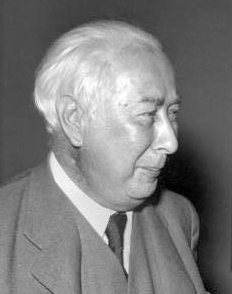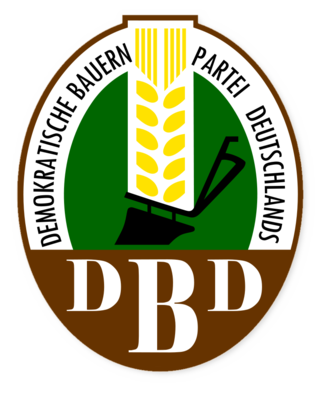
The Christian Democratic Union of Germany is a Christian democratic and liberal conservative political party in Germany. It is the major catch-all party of the centre-right in German politics.

The German Democratic Party was a liberal political party in the Weimar Republic, considered centrist or centre-left. Along with the right-liberal German People's Party, it represented political liberalism in Germany between 1918 and 1933. It was formed in 1918 from the Progressive People's Party and the liberal wing of the National Liberal Party, both of which had been active in the German Empire.

Theodor Heuss was a German liberal politician who served as the first president of West Germany from 1949 to 1959. His cordial nature – something of a contrast to the stern character of chancellor Konrad Adenauer – largely contributed to the stabilization of democracy in West Germany during the Wirtschaftswunder years. Before beginning his career as a politician, Heuss had been a political journalist.

The Christian Democratic Union of Germany was an East German political party founded in 1945. It was part of the National Front with the Socialist Unity Party of Germany (SED) and a bloc party until 1989.

The Democratic Farmers' Party of Germany was an East German political party. The DBD was founded in 1948. It had 52 representatives in the Volkskammer, as part of the National Front. The DBD participated in all GDR cabinets. The founding of the DBD was an attempt by the SED to weaken the influence of CDU/LDPD in the rural community by establishing a party loyal to the SED. The leadership cadre came mainly from the ranks of the SED. In the late 1980s, the party had 117,000 members.

The Liberal Democratic Party of Germany was a political party in East Germany. Like the other allied bloc parties of the Socialist Unity Party of Germany (SED) in the National Front, it had 52 representatives in the People's Chamber.

The Landtag of Bavaria, officially known in English as the Bavarian State Parliament, is the unicameral legislature of the German state of Bavaria. The parliament meets in the Maximilianeum in Munich.
The Progressive People's Party was a social liberal party of the late German Empire.

Friedrich Naumann was a German liberal politician and Protestant parish pastor. In 1896, he founded the National-Social Association that sought to combine liberalism, nationalism and (non-Marxist) socialism with Protestant Christian values, proposing social reform to prevent class struggle. He led the party until its merger into the Free-minded Union in 1903. From 1907 to 1912 and again from 1913 to 1918, he was a member of the Reichstag of the German Empire.
This article aims to give a historical outline of liberalism in Germany. The liberal parties dealt with in the timeline below are, largely, those which received sufficient support at one time or another to have been represented in parliament. Not all parties so included, however, necessarily labeled themselves "liberal". The sign ⇒ denotes another party in that scheme.
This article gives an overview of liberalism and the historical radicalism movement within liberalism in Switzerland. It is limited to liberal and radical parties with substantial support, mainly proved by having had a representation in parliament. The sign ⇒ means a reference to another party in that scheme. For inclusion in this scheme it isn't necessary that parties labeled themselves as a liberal party.

Reinhold Maier was a German politician and the leader of the FDP from 1957–1960. From 1946 to 1952 he was Minister President of Württemberg-Baden and then the 1st Minister President of the new state of Baden-Württemberg until 1953.

Theodor Barth was a German liberal politician and publicist. He was a member of the Reichstag between 1881 and 1884, between 1885 and 1898, and between 1901 and 1903.
The Christian Social Party was a right-wing political party in the German Empire founded in 1878 by Adolf Stoecker as the Christian Social Workers' Party.

Hellmut Georg von Gerlach was a German journalist and politician.
The CDU Baden-Württemberg is the political party with the most members in the German state of Baden-Württemberg and the second largest state party of the Christian Democratic Union of Germany with almost 65,000 members. Its chairman is Thomas Strobl, who succeeded Stefan Mappus after the lost 2011 election.

Ernst Ludwig von Gerlach was a Prussian politician, editor and judge. He is considered one of the main founders and leading thinkers of the Conservative Party in Prussia and was for many years its leader in the Prussian House of Representatives. Like his brother Leopold von Gerlach, he belonged to the circle that formed around the Neue Preußische Zeitung, in the founding of which he also played a leading role.
The Free-minded Union or Radical Union was a liberal party in the German Empire that existed from 1893 to 1910.
The German Social Party was a far-right political party active in the German Empire.
Arnold Gohr was a German clerical worker who became a trade unionist and activist. After 1945 he entered mainstream politics in East Berlin. As the Soviet occupation zone evolved into a Soviet sponsored one-party dictatorship, he never joined the ruling party, remaining instead a leading "collaborationist" member of the eastern version of the Christian Democratic Union. He became a party chairman and served between 1948 and 1958 as "deputy lord mayor" of Berlin, a period during which the increasingly divided city's constitutional status and future were contentious and ambiguous on a number of different levels.











